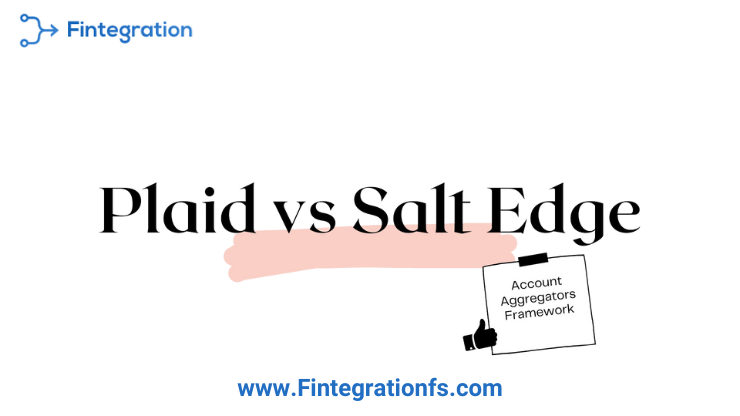Plaid vs. MX Account Aggregator: Challenges and Success Stories
- Arpita Maharishi
- Sep 25, 2023
- 4 min read
Updated: Feb 2

In the world of finance, Fintegration, powered by Account Aggregator Frameworks (AA), is changing the game. These frameworks empower individuals to securely share their financial data with authorized third-party apps and services with their consent. The possibilities are endless:
Similarly, we have compared Plaid vs. Salt Edge
Exploring Plaid Vs MX in Open Banking Services:
Features:
Plaid: Offers account aggregation, data enrichment, fraud detection, payment processing, and identity verification.
MX: Provides account aggregation, data enrichment, budgeting, forecasting, credit reporting, fraud detection, and personal finance management.
Pricing:
Plaid: Charges per transaction fees with volume discounts, varying by product.
MX: Utilizes a monthly subscription model, with costs based on user count and feature selection.
Overall:
Plaid: Ideal for those seeking user-friendliness and a broad feature set.
MX: Suited for businesses requiring a comprehensive feature set.
Plaid FinTech Advantages:
Multiple Products: Plaid supports various functionalities, including account authentication, balance checks, transaction history retrieval, and income verification, catering to diverse financial applications
Extensive Coverage: Plaid boasts connections to a vast network of financial institutions, including major banks and credit unions. This broad coverage makes it a reliable choice for applications needing wide accessibility.
MX FinTech Advantages:
Financial Wellness Tools: MX provides tools and features that go beyond basic data aggregation, such as budgeting tools, financial health scores, and personalized recommendations.
Data Enhancement: MX excels at cleaning, categorizing, and enriching financial data. Their platform provides deep insights into user spending habits, financial health, and potential areas for improvement.
Additional Considerations for Open Banking:
Assess your specific business needs, as some features are unique to each platform.
Compare pricing structures to find the most cost-effective solution.
Consider the size and reputation of each platform's customer base.
Evaluate ease of use, especially if you lack technical expertise.
Research customer reviews to gauge support quality.

Real-World Success Stories of Open Banking with Account Aggregator Frameworks
Plaid
PayPal: Plaid is crucial in connecting users to their bank accounts. This allows users to swiftly and effortlessly fund their PayPal wallets and execute withdrawals from their PayPal accounts.
Robinhood: Plaid assists Robinhood users in linking their bank accounts with their Robinhood accounts, streamlining the process of funding their Robinhood accounts, and initiating trading activities.
LendingClub: Plaid is instrumental in aiding LendingClub's efforts to verify loan applicants' income and employment details. This verification process enables LendingClub to expedite lending decisions, making them more informed and efficient.
Block (formerly Square): Plaid is the engine behind Block's ability to enable users to seamlessly connect their bank accounts to their Block accounts. This functionality empowers users to conveniently deposit and withdraw funds from their Block accounts.
MX
Chime: MX plays a pivotal role in Chime's mission to offer users a comprehensive view of their financial landscape. By aggregating data from bank accounts, credit cards, and various financial institutions, Chime provides users with a holistic understanding of their finances.
Personal Capital: MX enhances Personal Capital's ability to provide users with valuable financial planning and investment management tools, aiding them in achieving their financial goals.
Challenges and Opportunities with Plaid vs MX Account Aggregator Frameworks
Technical Complexity: AA frameworks require advanced technical sophistication to ensure secure and efficient data sharing with robust encryption and access controls.
Regulatory Compliance: Complying with complex data protection and privacy regulations is essential but can be time-consuming.
Business Adoption: Convincing banks, financial institutions, and fintech companies to embrace AA frameworks while addressing security and privacy concerns is crucial.
User-Friendliness: Ensuring AA frameworks are user-friendly and easy to understand is vital to building consumer trust and encouraging financial data sharing.
Data Accuracy: Maintaining data accuracy in a constantly changing financial landscape can be challenging.
Despite these hurdles, Mx vs Plaid AA frameworks have the potential to revolutionize the financial services industry. They can enhance financial inclusion, reduce fraud, and optimize service efficiency by simplifying the secure sharing of financial data.
Alternatives of Plaid:
MX: MX focuses on data enhancement and user experience. They offer tools for data cleansing, categorization, and insights, aiming to improve the overall user experience within financial apps. MX also emphasizes data privacy and security.
Mastercard Finicity: Acquired by Mastercard, Finicity offers a comprehensive suite of data aggregation and financial intelligence tools. They emphasize data security and compliance and cater to a wide range of use cases, including lending, personal finance, and wealth management.
Akoya: Akoya is backed by major financial institutions like Fidelity Investments, which gives them credibility and resources to compete effectively.
Their partnerships with key players in the financial ecosystem further strengthen their position.
Yodlee: A long-standing player in the financial data aggregation space, Yodlee provides access to a vast network of financial institutions. They offer a wide range of services, including account aggregation, payments, and risk management tools.
TrueLayer: Similar to Salt Edge, TrueLayer focuses on open banking and PSD2 compliance, particularly within the European market. They provide a streamlined API for accessing bank accounts and initiating payments
Salt Edge: Salt Edge specializes in open banking solutions and PSD2 compliance. They offer a secure and reliable platform for accessing financial data across Europe and beyond. Their focus on open banking makes them a strong choice for businesses operating within that regulatory framework
Teller FinTech: Teller focuses on simplifying the process of connecting to bank accounts, offering a user-friendly API and SDKs. They aim to make integration easier and faster for developers
Basiq FinTech: Basiq offers access to financial data through APIs, focusing on the Australian and New Zealand markets. They provide tools for data aggregation, insights, and payments.
Understand your use case & apply for the right partnership. Our team at FintegrationFS can help you select the right partner. Please schedule a call.

